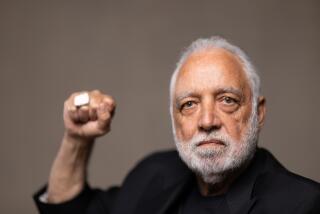Cult Leader Defies His Detractors, Seeks a Spot in Miami’s Mainstream
- Share via
MIAMI — The menu included white wine, pasta salad and--for some--the first taste of Yahweh ben Yahweh.
“Egypt has her pyramids. India has her Taj Mahal. France has her Eiffel Tower,” the self-proclaimed son of God told business leaders and politicians. “Miami has the son of Yahweh. The world’s greatest attraction is in your midst. . . . I’m here.”
Yahweh’s lunch appearance before the elite Manatee Bay Club in May was full of self-glorifying rhetoric, his trademark since arriving in Miami 11 years ago. But it also signified another important step in his strategy to win acceptance among business and political power brokers.
At times, the 54-year-old former Hulon Mitchell Jr. sounds more like a Rotary Club booster than leader of a white-robed sect under federal investigation for alleged crimes that could include extortion and the murder of “blasphemers.”
Ben Yahweh boasts of his estimated $8 million in meticulously renovated real estate, including motels, a recording studio and a new supermarket. He speaks passionately about improving blighted neighborhoods and using capitalism to help impoverished blacks.
He has hobnobbed with developers, city commissioners and Mayor Xavier Suarez. Followers have abandoned their six-foot wooden staffs for briefcases and are encouraged to learn a little Japanese to help business.
Ben Yahweh is just as committed to denying allegations against his Temple of Love Inc., subject of a federal grand jury probe. He calls detractors jealous, spiteful and drug-addicted. He calls himself the “prince of peace.”
“You know well that good is going to overcome evil,” said Yahweh at a recent interview in his attorney’s office. “That’s what ‘Star Wars’ is all about.”
The story of Yahweh ben Yahweh could also be movie material.
Drought and depression were strangling Oklahoma in October, 1937, when Hulon and Pearl Olive Mitchell had the first of 13 children. The son, named after his father, grew up in the black section of Enid, Okla.
The Mitchell children sang in the choir of their father’s Pentecostal church. One, Leona Mitchell, would become a soprano with New York’s Metropolitan Opera.
Hulon Jr. married at 19 and studied psychology at Phillips University in Enid. After a divorce, he moved to Atlanta and earned a master’s degree in economics at Atlanta University. A second marriage ended in separation.
In Atlanta, he began to preach interpretations of the Bible under the name Father Michel.
He moved to Miami’s Liberty City section in 1979, claiming to be the messiah of a lost black tribe of Israel. His turban is held by a gold pin bearing his name in Hebrew--”God, the son of God.”
In the early 1980s, Yahweh and followers mostly confined themselves to Miami’s black neighborhoods, seeking money and converts. They began to acquire both.
They also began to establish a militant reputation. In 1986, tenants of an apartment building north of Miami resisted eviction after the sect purchased it. There were scuffles, shouting matches and slayings.
A former Yahweh member, Robert Rozier, pleaded guilty to killing two tenants and to two other slayings. He was sentenced to 22 years in prison and is helping federal prosecutors investigate the sect.
Last year, a federal judge in Miami awarded 27 tenants more than $1.5 million for wrongful eviction and blasted the Yahwehs for a “terrorist occupation strategy.” Thomas Equels, an attorney for the tenants, said two wrongful death suits were settled for about $500,000.
Ben Yahweh testified in court that he had no role in the violence. He has not been charged.
Since the apartment incident and other allegations of Yahweh-related harassment, Ben Yahweh has worked diligently to recast the group’s image.
He’s backed away from fist-pounding messages about white oppression and retribution against “blasphemers.” He says he was speaking figuratively about toppling white-dominated industries when he told followers to bring him “the head of a white man.”
He cultivates ties with political leaders, black and white, and belongs to mainstream business groups, including the Greater Miami Chamber of Commerce and the American Hotel Motel Assn.
“The focus is always on my detractors, on negativity,” he said. “They may focus for two seconds on a physical building or something that I’ve swept out of the ghetto. And they ignore how I’ve brought this building alive without drugs, without crime. . . . For all around that building is still full of crime, drugs, alcoholism, fights and destruction.”
The Yahwehs’ work has not gone completely unheralded.
Three years ago, the Miami’s Urban League chapter gave Ben Yahweh its highest honor, the Whitney M. Young Humanitarian Award, named for the league’s national president during the ‘60s.
“Yahweh ben Yahweh demonstrates that you can take depressed properties and turn them around,” said T. Willard Fair, president of the Urban League of Greater Miami. “He’s an inspiration to the entire community.”
“You have very few mainstream religious groups willing to invest in the community like the Yahwehs,” said Newell Daughtrey, director of the Business Assistance Center, a development group focusing on black neighborhoods. “I don’t know where their money comes from. I don’t know why someone would follow him. All I know is what I observe. And all I’ve seen has been good economically.”
Ben Yahweh denies that he requires disciples to surrender their money, but declined to give details on the group’s finances or membership. Yahweh followers approached on the streets refused to discuss their faith or finances.
State records show the Temple of Love is incorporated as a nonprofit company. But Ben Yahweh is not among the executives listed with the Florida secretary of state’s office.
The sect also tightly regulates contact with its leader. Interviews with him are videotaped. He claims that a metal detector at the Temple of Love is used to screen for guns and other weapons.
“My people are good. There is nothing to hide,” he said. “I teach my people to drive 29 m.p.h. in a 30-m.p.h. zone.”
A federal grand jury is looking into whether Yahweh and close aides in the Temple of Love ran a criminal enterprise from 1981 to 1986. Press reports suggest that the probe includes allegations of extortion, arson and murder.
More to Read
Sign up for Essential California
The most important California stories and recommendations in your inbox every morning.
You may occasionally receive promotional content from the Los Angeles Times.










